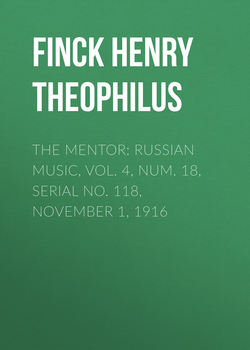The Mentor: Russian Music, Vol. 4, Num. 18, Serial No. 118, November 1, 1916

Реклама. ООО «ЛитРес», ИНН: 7719571260.
Оглавление
Finck Henry Theophilus. The Mentor: Russian Music, Vol. 4, Num. 18, Serial No. 118, November 1, 1916
Several Natural Questions
RUSSIAN MUSIC. Michal Ivanovich Glinka
RUSSIAN MUSIC. Anton Rubinstein
RUSSIAN MUSIC. Modeste Petrovich Moussorgsky
RUSSIAN MUSIC. Peter Ilich Tchaikovsky
RUSSIAN MUSIC. Nicholas Andreievich Rimsky-Korsakov
RUSSIAN MUSIC. Igor Stravinsky
RUSSIAN MUSIC
Russian Choirs and Basses
Italian and French Influences
Glinka, the Pioneer
Rubinstein, the Russian Mendelssohn
Tchaikovsky, the Melancholy
Moussorgsky and Musical Nihilism
Rimsky-Korsakov and the Nationalists
Stravinsky and the Russian Ballet
The Character of Russian Music
Отрывок из книги
Michal Ivanovich Glinka at an early age showed that he possessed two characteristics that were to have a very important bearing on his whole life – an extremely nervous disposition and a lively aptitude for music. His grandmother, who was responsible for his early upbringing and who was an invalid herself, encouraged the first; while his father stimulated in the boy the second. Glinka, mollycoddled from childhood, never wholly succeeded in throwing off an inherited brooding tendency; but he became a wonderful composer and musician.
Glinka was born on June 2, 1803, at Novospassky, a little village in Russia. His father was a retired army officer and not particularly well off, but his mother’s brother was fairly wealthy, and often when the Glinkas had an entertainment this brother lent them a small private band which he kept up. It was to this early association with music of the best class that young Glinka owed the development of his taste.
.....
The plot of this opera was based on the following story: In 1613 the Poles invaded Russia and attempted to assassinate the newly elected Czar, Michael Romanoff. The Polish leaders, however, did not know where to find the Czar. Without letting him know who they were, they asked a peasant, Ivan Soussanin, to guide them to the monarch. Ivan, however, suspecting their designs, sent his adopted son to warn the Czar, and himself led the Poles to the depths of a forest from which they could not possibly find their way. The Poles, when they saw that they had been deceived, killed Soussanin.
This opera was the turning point in Glinka’s life. It was a great success, and in a way became the basis of a Russian school of national music. The opera enjoyed extraordinary popularity. In December, 1879, it reached its 500th performance, and in November, 1886, a special production was given, not only at Petrograd, but in every Russian town that had a theater, in celebration of the 50th anniversary of its first performance. It was presented at two theaters in Moscow at the same time.
.....